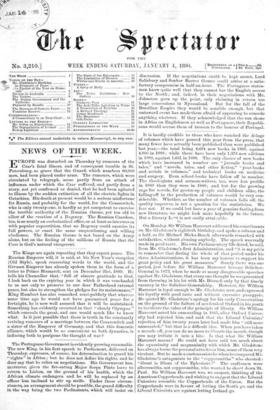It is hardly credible to those who have watched the
deluge of volumes which have poured this year from the press, that many fewer have actually been published than were published last year,—the total being 4,694 new books in 1889, against 4,960 in 1888 ; while there have been only 1,373 new editions in 1889, against 1,631 in 1888. The only classes of new books which have increased in number are "juvenile books and tales," and "novels, tales, and other fiction," "year-books and serials in volumes," and technical books on medicine and surgery. Even school-books have fallen off in number. The theologians and sermon-writers, too, were less prolific in 1889 than they were in 1888; and but for the growing rage for novels, for grown-up people and children alike, the falling-off in the production of volumes would be very con- siderable. Whether, as the number of volumes falls off, the quality improves, is not a question for the statistician. We fear not. If we could but have a year of genuine fasting from new literature, we might look more hopefully to the future. But a literary L7,4 is not easily attainable.
On Monday, Si William Harcourt addressed his constituents on Mr. Gladstone's eightieth birthday, and spoke a column and a half, as Sir Michael Hicks-Beach afterwards remarked with satisfaction, without abusing anybody. The speech was really made in good taste. His own Parliamentary life dated, he said, from Mr. Gladstone's first Administration, and " it is my price to remember that during the whole of that period under his three Administrations, it has been my honour to support his great policy and his great measures." Surely there was one period, just before Sir William Harcourt became Solicitor- General in 1873, when he made so many disagreeable speeches against Mr. Gladstone, that every one thought he was prevented from throwing in his lot with Mr. Disraeli only by that timely vacancy in the Solicitor-Generalship. However, Sir William Harcourt is loyal enough to Mr. Gladstone now, and expressed his loyalty with good taste and without excessive panegyric. He quoted Mr. Gladstone's apology for his early Conservatism on the ground of the failure of academical Oxford in his youth to inculcate the value of the principle of liberty. Sir William Harcourt noted his unmuzzling in 1865, after Oxford Univer- sity had rejected him, and said that the Liberal Unionists' rejection of him twenty years later had made him " still more unmuzzled ;" but that is a difficult idea. When you have taken a muzzle off, you can do no more to liberate the mouth, though you may irritate it into a bite. Is that what Sir William Harcourt means ? He could not have said too much about the equanimity and magnanimity with which Mr. Gladstone has always borne the personal attacks on him, some of them very virulent. But he made a curious mistake when he compared Mr. Gladstone's antagonists to the " coppersmiths" who shouted : " Great is Diana of the Ephesians !" The craftsmen were silversmiths, not coppersmiths, who wanted to shout down St. Paul. Sir William Harcourt was, we suspect, thinking of the American Copperheads, and wishing to suggest that the Liberal Unionists resemble the Copperheads of the Union. But the Copperheads were in favour of letting the South go, and the Liberal Unionists are against letting Ireland go.














































 Previous page
Previous page